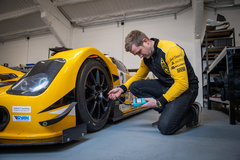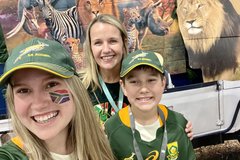Royal Navy veteran Michael Kelly—proud dad and husband, avid reader and arctic survivalist—is the Maintenance Group Leader at our Newcastle Innovation Centre and the Veterans Employee Resource Group leader for the North UK area.

There isn’t a typical day, to be honest—especially in research and development and testing. We know what we need to achieve, but the road getting there changes daily. The products we test areflexible pipelines for offshore oil and gasand they are almost always new, so we have no idea how they’re going to react to what we’re doing. We set up to get test results, and then we have to interpret those results and pivot depending on the outcomes. We have a manufacturing plant that makes the products, and we get samples of it—typically the products we sell are hundreds of meters long, but we’ll get samples that are 10-15 meters long to test. We have to qualify these products for 25 years’ service life. Obviously, we don’t have the luxury of 25 years to test it, so we have to artificially age and damage the pipe to see how it’s going to react in certain sea conditions. We’ll heat it, pressure-cycle it and destructively test it to its limits to give the customer the confidence that it’s going to last as long as we say it will. It’s exciting, because each day is different, and we’re delivering new technologies and new ways of bringing energy to the world safely. I get to take a product from concept through to delivery, and it’s really rewarding.
I’ve been with the company since 2011. When I first took this role, we were mainly looking at developing our current portfolio of products, but since then we have had some major breakthroughs withnon-metallics, which will be a game-changer for the industry and our customers. I feel very fortunate to be working with an amazing team of engineers and technicians—it excites me to see what roles we’ll all play in the energy transition. Knowing that this team will be part of that journey is inspiring.I love working for Baker Hughes as I get to see new and innovative technologies being delivered to our customers, and I get to be a part of a great team.I’m really proud of how far we’ve come from where we started.
I joined straight from school when I was 17 to be an aircraft engineer. I spent most of my time in war zones in the Middle East, Sierra Leone and Northern Ireland. I liked the idea of being able to learn a trade whilst seeing the world. I’ve seen a lot of places that most people would never get to see. One that stands out is the arctic. Every year, I would have to requalify in arctic survival training. We’d be dropped 200 miles inside the arctic circle and had to live remotely with the aircraft in survival mode. Generally, you’d spend 4-6 weeks there learning your skills and your aircraft, and then you’d be literally 'dumped' in the middle of nowhere to survive for three nights. I looked forward to that the most—I enjoyed the challenge.

A lot of guys in the military have been through really, really tough times and handled really tough situations, so having that network of support is important. So, part of the ERG’s role is building that community and that spirit—at local, national and global levels; giving people the opportunity to stay in touch, to connect on a professional and social level, and to offer support to each other. And it doesn’t matter if you ‘belong’ in a certain group. In the Veterans ERG, we want people to be a part of our community whether they’ve served or not. These groups are all here to support people and to give a different perspective. That’s why I’m also a member of the Multicultural ERG and an ally of the Women’s Network.
For more information about our Employee Resource Groups, clickhere.
Energy Forward Stories
Sign up to stay up to date on the latest innovations and people shaping the future of our industry.




